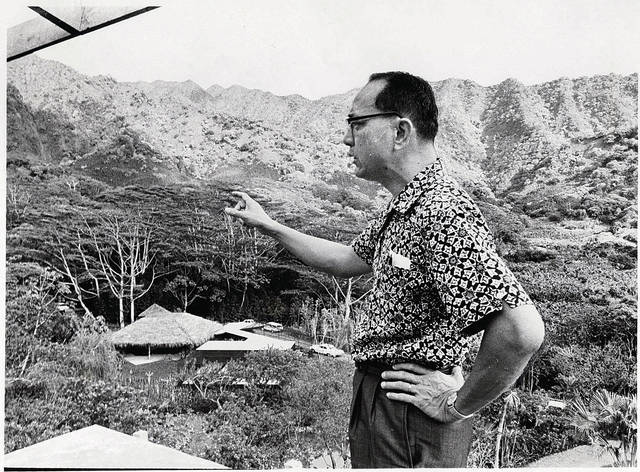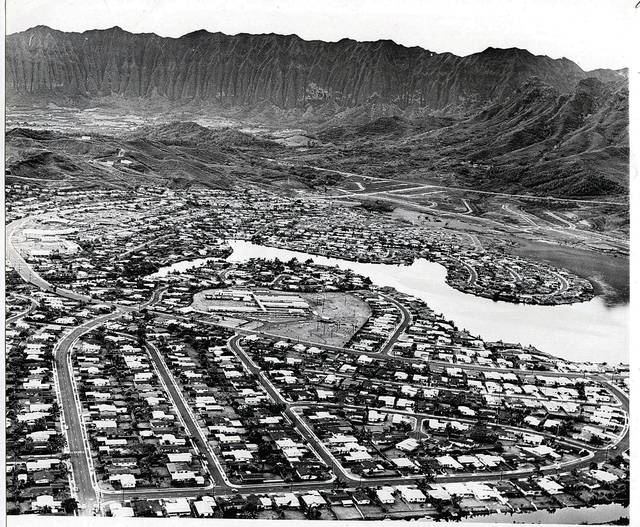Paradise Park founder had knack for numbers and real estate

STAR-ADVERTISER / 1971
Above, Wong points to lush vegetation from the top of the restaurant building at his Paradise Park development in Manoa.

STAR-ADVERTISER / 1967
James W.Y. Wong was executive vice president of Hawaiian Pacific Industries when the company developed Enchanted Lake in Kailua.


Many people have experienced Paradise Park, live in Enchanted Lake, or patronize neighborhood retail complexes such as Waipahu Shopping Plaza, Puck’s Alley and Waiakamilo Shopping Center. Others may have stayed at the Palms Hotel in Waikiki or miss Hawaii’s original Trader Vic’s restaurant on Ward Avenue.
These places are all linked to the legacy of James W.Y. Wong, a Maui-born accountant who became a prolific local real estate developer.
Wong, also known as Jimmy, died Nov. 22. He was 94.
Son Darryl Wong said his father’s heart appeared to give out on what began as a typical day for someone who gave up driving only last year and was still involved in the family real estate business, which includes property investments and an effort to redevelop the former Paradise Park exotic bird attraction into a Hawaiian cultural park.
“He worked to the very last day,” Darryl Wong said of his father, who lived on Tantalus. “He was lecturing me on the night before he passed.”
Wong is probably most known for establishing Paradise Park in Manoa Valley. But he also developed real estate on Oahu, taught accounting at Chaminade College and in recent years lobbied for bills at the Legislature to improve affordable-housing production.
Don't miss out on what's happening!
Stay in touch with breaking news, as it happens, conveniently in your email inbox. It's FREE!
Wong’s long career grew out of his own accounting practice after earning a business degree from Golden Gate College. One of his clients was local developer Joseph Pao of Hawaiian Pacific Industries, where Wong served as auditor. After five years, Wong joined Pao’s firm in 1960 as an executive vice president overseeing sales, finance, insurance and public relations.
Hawaiian Pacific initially built a subdivision in Aina Haina and followed with a project in Kailua called Enchanted Lake, planned for 2,000 homes around a 74-acre lake. The company also partnered to develop 25,000 homes along with industrial and retail uses on 10,000 acres of former Oahu Sugar Co. land around Halawa and Aiea.
Pao’s company also developed lots in Waialae-Kahala, built an office building on Ala Moana Boulevard and purchased the Palms Hotel at 431 Nahua St. for expansion.
“Building Hawaiian Pacific Industries would have been almost impossible without the expert help of Jimmy Wong,” Pao said in a 1960 Honolulu Advertiser story.
Wong left the company in 1961 to do his own real estate projects, which included the Safeway store in Kailua, Waipahu Terrace Apartments, Royal Court condominium on Ward Avenue, Waipahu Shopping Plaza, Puck’s Alley and Waiakamilo Shopping Center.
In 1964, Wong bought the site of Trader Vic’s for $758,500 and with a partner developed an office high-rise anchored by the Honolulu Club that replaced the South Seas-themed restaurant established around 1940.
Wong also developed projects in Alaska, where he took his family on annual summer trips that started with a quest to fish for salmon.
Lambert Wai, a retired local insurance agency owner, invested in several Alaska real estate deals with Wong and said his former partner had a keen sense for property values and was astute at managing finances.
“He was a very sharp businessman,” said Wai, 96. “I left everything up to him.”
In Manoa, Wong spent $2 million to open Paradise Park in 1968 despite opposition from many Manoa residents who didn’t want a tourist attraction near their homes.
Wong developed the park as a botanical and zoological garden on private conservation land under a permit from the state Board of Land and Natural Resources.
According to a 1967 Honolulu Star-Bulletin story, Wong envisioned the project in 1962 but figured tourism wasn’t big enough in Hawaii to support such a venture. Then after seeing results at Sea Life Park and Polynesian Cultural Center, he went forward with his plan that included an aviary topped by a Polynesian-themed restaurant, shows with trained birds, gardens, spider monkeys, a bamboo forest and flamingos on a lake. Attendance peaked at around 300,000 visitors a year.
In 1994, Paradise Park closed. Then in 2014, Wong floated a $15 million plan to restore the property and feature Native Hawaiian cultural displays, hula shows, a hula museum, a descriptive history of the valley and nine gardens.
“I’m going to try and leave as much there as possible in its natural state,” Wong said at the time.
Again, many Manoa residents opposed the plan but failed to block a permit.
BLNR approved a modified permit for the park in 2014, but a construction deadline expired and now the project led by Darryl Wong needs to produce an environmental assessment before returning to the board to seek new approval.
Services for Wong are scheduled for Jan. 17 at the Cathedral Basilica of Our Lady of Peace. Visitation starts at 8 a.m. followed by services at 8:45 a.m. Wong is survived by sons Darryl, Garret and Warren; brothers Lawrence and Stanley; and sisters Laura Medeiros and Rosie Sagon.




